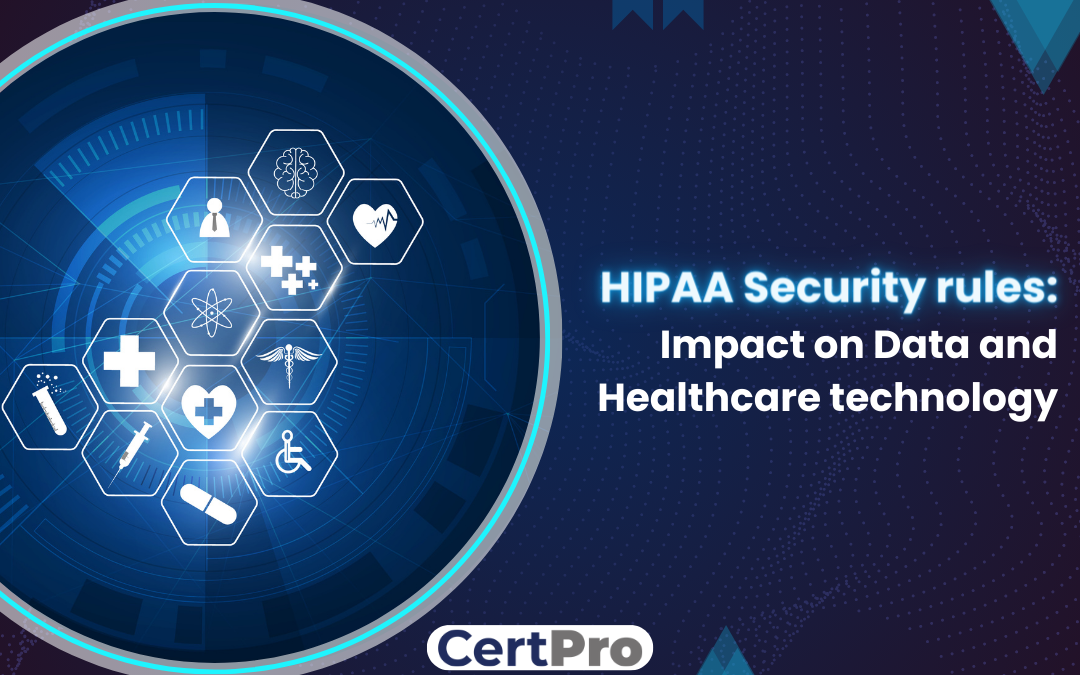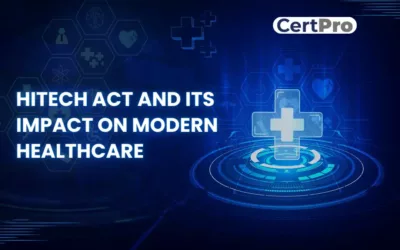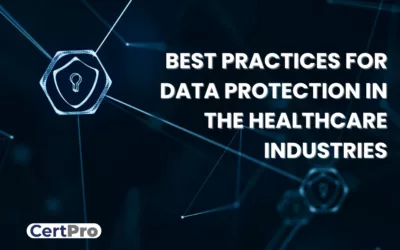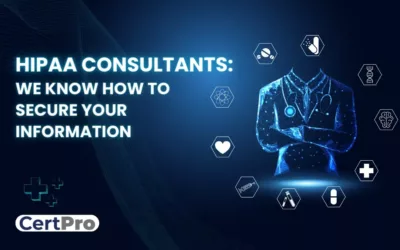In the rapidly evolving landscape of healthcare technology, the protection of patient privacy and the security of sensitive data have become paramount concerns. The Health Insurance Portability and Accountability Act (HIPAA) has emerged as a critical framework for addressing these challenges, making a profound impact on healthcare technology and HIPAA data security.
It sets stringent standards for the safeguarding of patient health information (PHI) and plays a pivotal role in guiding healthcare organizations’ practices and policies regarding data protection and privacy.
It emerged as a critical framework that addresses these concerns, playing a vital role in safeguarding patient privacy and setting standards for healthcare technology and data security. This article delves into the profound impact of HIPAA rules on healthcare technology and data security, exploring the significance of compliance, the challenges faced, and the measures taken to protect patient data in the digital age.
WHAT IS HIPAA SECURITY RULES?
The HIPAA security rules were enacted in 1996 with the primary goal of safeguarding patient health information (PHI) and ensuring its confidentiality and security. It involves two rules: the Privacy Rule and the Security Rule.
The Privacy Rule establishes standards for protecting individuals’ medical records and other PHI, ensuring that healthcare providers and organizations handle patient information with care. The Security Rule, on the other hand, focuses on the technical and administrative safeguards required to protect electronic protected health information (ePHI).
SCOPE OF HIPAA’S IMPACT ON HEALTH IT AND DATA PRIVACY
The impact of HIPAA rules on healthcare technology and data security is broad and comprehensive. It encompasses various aspects of healthcare technology and aims to protect the privacy and security of individuals’ personal health information (PHI). The key areas where it has a significant impact are:
1. Electronic Health Records (EHRs): It has influenced the widespread adoption and implementation of electronic health records in healthcare organizations. It sets standards for the security and privacy of PHI within EHR systems.
2. Data Security Measures: It mandates the implementation of various data security measures to protect PHI. Covered entities must implement administrative, physical, and technical safeguards to secure electronic PHI (ePHI).
3. Privacy Regulations: The HIPAA Security Rules establish standards for the use and disclosure of PHI. It outlines patients’ rights to access their health information, request amendments, and be informed about how their information is used.
4. Business Associate Relationships: It introduced the concept of Business Associate Agreements (BAAs) to regulate the relationships between covered entities and their business associates.
5. Breach Notification Requirements: The breach notification rule mandates covered entities to notify affected individuals, the Department of Health and Human Services (HHS), and, in certain cases, the media, in the event of a data breach involving PHI.
6. Enforcement and Penalties: Its enforcement has become more rigorous over the years, with the Office for Civil Rights (OCR) actively investigating complaints and conducting audits to ensure compliance. Non-compliance with regulations can result in significant penalties, including monetary fines and reputational damage.
In summary, HIPAA rules on healthcare technology and data security are far-reaching. It influences the adoption of electronic health records, sets standards for data security measures, regulates privacy practices, mandates breach notification, and establishes penalties for non-compliance.
BENEFITS OF HIPAA’S EFFECT ON HEALTH IT AND DATA PRIVACY
Its impact on HIPAA rules on healthcare technology and data security has brought numerous benefits to the healthcare industry. Here are the key advantages:
1. Enhanced Patient Privacy: It has significantly improved patient privacy by establishing strict standards for the use and disclosure of personal health information (PHI).
2. Strengthened Data Security: The impact has led to enhanced data security measures. Covered entities must implement administrative, physical, and technical safeguards to protect PHI from unauthorized access, breaches, and cybersecurity threats.
3. Promoted Adoption of Electronic Health Records (EHRs): It has encouraged the widespread adoption of EHRs, replacing paper-based records. EHRs improve healthcare delivery by providing accessible and comprehensive patient data to authorized providers.
4. Facilitated Secure Data Exchange: The impact has facilitated secure data exchange between healthcare entities. It sets standards for electronic transactions, ensuring interoperability and standardized protocols for secure data transmission.
5. Encouraged Business Associate Accountability: The introduction of Business Associate Agreements (BAAs) has ensured that third-party vendors and service providers handling PHI are accountable for data security.
In conclusion, HIPAA rules on healthcare technology and data security have resulted in enhanced patient privacy, strengthened data security measures, widespread adoption of EHRs, secure data exchange, business associate accountability, and increased awareness and compliance.
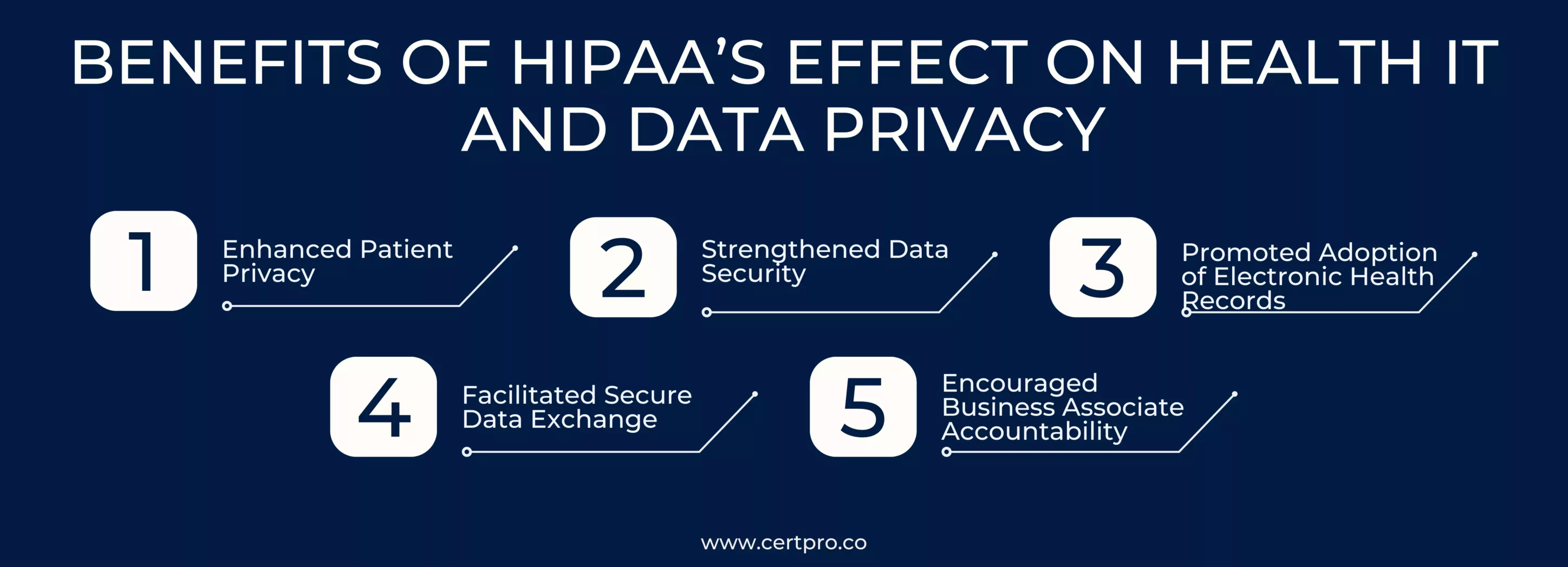
HIPAA’S IMPACT ON HEALTHCARE TECHNOLOGY
Healthcare technology has had a significant impact on the healthcare industry over the years, revolutionizing various aspects of patient care, diagnosis, treatment, and administrative processes.
1. Improved patient care and outcomes: Healthcare technologies have enabled more accurate and timely diagnosis, leading to better patient outcomes. Advanced imaging technologies, such as magnetic resonance imaging (MRI) and computed tomography (CT), provide detailed insights into the body, aiding in early detection and treatment planning.
2. Electronic Health Records (EHRs): EHRs have replaced traditional paper-based medical records, allowing healthcare providers to access and share patient information securely. EHRs enhance care coordination, reduce medical errors, and provide a comprehensive view of the patient’s medical history, medications, and allergies.
3. Artificial Intelligence (AI) and Machine Learning (ML): AI and ML have revolutionized healthcare by analyzing vast amounts of data quickly and accurately. These technologies can assist in diagnosing diseases, identifying patterns in medical imaging, predicting patient outcomes, and recommending treatment plans.
4. Telemedicine and remote monitoring: Telemedicine enables remote consultations, diagnosis, and treatment, eliminating geographical barriers and increasing access to healthcare services. Patients can consult with healthcare providers through video calls, receive medical advice, and get prescriptions without physically visiting a clinic. Remote monitoring technologies, such as wearable devices and remote sensors, allow healthcare providers to track patients’ vital signs and health parameters in real-time, enabling.
5. Data analytics and population health management: Healthcare technology allows for the collection and analysis of large-scale healthcare data, leading to population health management initiatives. By leveraging data analytics, healthcare organizations can identify health trends, disease patterns, and risk factors in specific populations.
6. Efficient healthcare operations: Healthcare technology streamlines administrative processes, reduces paperwork, and improves operational efficiency.
CHALLENGES IN HIPAA DATA SECURITY
Challenges in HIPAA data security within the healthcare industry are significant and require ongoing attention and proactive measures to mitigate risks. Here are some key challenges:
1. Evolving Cybersecurity Threats: Because it stores so much sensitive patient data, the healthcare industry is a major target for cyberattacks. The landscape of Cybersecurity threats continues to evolve, with hackers employing sophisticated techniques such as ransomware attacks, phishing, and social engineering.
2. Insider Threats: Healthcare organizations face risks within their own ranks. Employee negligence, intentional misconduct, or compromised credentials can lead to unauthorized access, data breaches, or data leaks.
3. Data Breaches and Incidents: Despite efforts to secure systems, data breaches can still occur. Breaches can result from vulnerabilities in software, hardware, or network infrastructure.
4. Compliance with Regulatory Standards: Ensuring compliance with HIPAA security rules and other data protection regulations presents challenges for healthcare organizations. Implementing the necessary administrative, physical, and technical safeguards of security rules and maintaining ongoing compliance can be complex and resource-intensive.
5. Legacy Systems and Infrastructure: Many healthcare organizations still rely on legacy systems and outdated technology that may lack robust security features. Securing and modernizing these systems can be challenging due to compatibility issues, resource constraints, and potential disruptions to daily operations.
In Conclusion, HIPAA data security challenges require a multi-faceted approach combining technical solutions, robust policies and procedures, employee training and awareness programs, and ongoing monitoring and risk assessments.
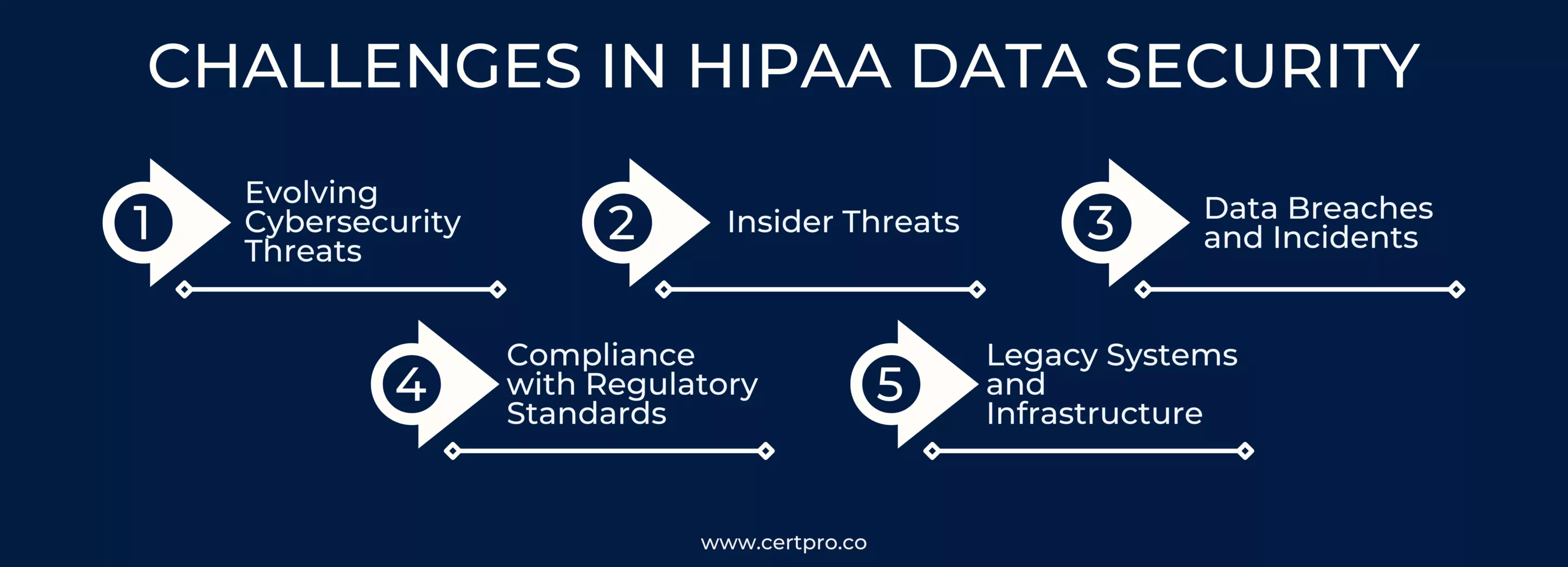
GET EXPERT ASSISTANCE FOR HIPAA’S IMPACT ON HEALTH CARE TECHNOLOGY AND DATA SECURITY
The Health Insurance Portability and Accountability Act (HIPAA) has emerged as a critical framework for addressing these challenges, making a profound impact on healthcare technology and HIPAA data security. For locating holes and weaknesses in the sector’s HIPAA compliance program, CertPro assesses policies and procedures, security controls, risk management, and training programs. CertPro offers a remediation plan and aids in its implementation based on the evaluation.
FAQ
HOW DOES HIPAA IMPACT HEALTHCARE TECHNOLOGY?
HIPAA security rules promote the adoption of electronic health records, set security standards, and influence the development of secure healthcare technology solutions.
WHAT SECURITY MEASURES DOES HIPAA REQUIRES?
HIPAA mandates administrative, physical, and technical safeguards like access controls, encryption, and regular risk assessments to protect patient data.
WHAT ARE THE CONSEQUENCES OF HIPAA NON- COMPLIANCE?
Non-compliance can result in penalties, fines, reputational damage, and potential criminal charges.
DOES HIPAA APPLIED TO THIRD – PARTY?
Yes, HIPAA extends its requirements to business associates, requiring them to comply with privacy and security standards.
HOW DOES THE HIPAA SECURITY REGULATION AFFECT DATA SHARE AND INTEROPERABILITY?
HIPAA security rules encourage secure data exchange and interoperability while ensuring privacy and security measures are in place.

About the Author
BHOOMIKA JOIS
Bhoomika Jois is a creative content writer specializing in compliance, ISO 27001, GDPR, and SOC 2. As a Social Media Marketing Specialist, she amplifies her engaging content. Bhoomika’s knack for simplifying complex topics makes compliance and cybersecurity accessible to all.
HITECH ACT AND ITS IMPACT ON MODERN HEALTHCARE
In 2009, the Health Information Technology for Economic and Clinical Health or HITECH Act was signed to transform the American healthcare industry. The laws worked as a forward-thinking process of changing patient services. In this regard, the Patient Protection and...
BEST PRACTICES FOR DATA PROTECTION IN THE HEALTHCARE INDUSTRIES
In the healthcare sector, safeguarding sensitive information about patients is extremely important. Patient data includes personal details, medical histories, and treatment plans. Therefore, it must be protected and should be confidential. Thus, breaches not only...
HIPAA CONSULTANTS: WE KNOW HOW TO SECURE YOUR INFORMATION
Navigating HIPAA compliance can be complex; therefore, organizations seek advice from HIPAA consultants. These HIPAA experts have specific knowledge. They can help firms to understand the problematic standards of the Healthcare Privacy Act. In 1996, HIPAA was created....

